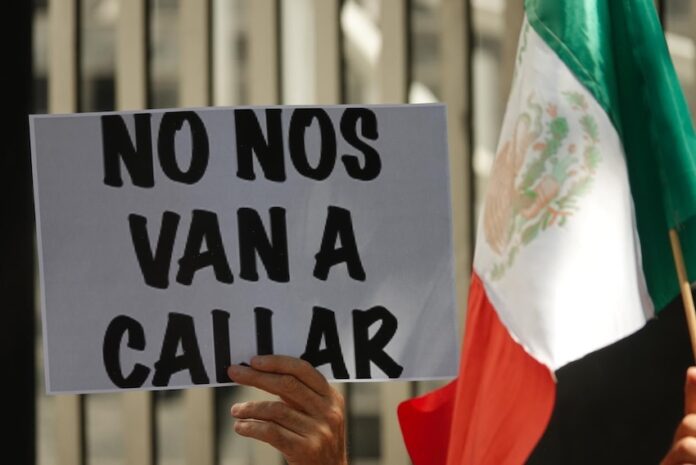Almost three in 10 Mexicans believe that the right to freedom of speech cannot be fully exercised in Mexico, according to the results of a recent poll.
In late July, the newspaper El Financiero asked 500 Mexican adults whether they agreed or disagreed with the following statement:
“In Mexico, freedom of speech can be fully exercised.”
According to the results published by El Financiero on Wednesday, 70% of respondents said they agreed with the statement, while 27% said they disagreed. The remaining 3% said they didn’t know whether they agreed or not.
Among university-educated Mexicans who were polled, almost four in 10 — 39% — said they disagreed with the statement.
Among poll respondents who identified themselves as supporters of the ruling Morena party, just 13% said they disagreed with the statement, while 84% said they believed that freedom of speech can be fully exercised in Mexico.
Among supporters of opposition parties, 38% said they disagreed with the statement, while 51% said they agreed with it.
Among respondents who identified themselves as non-partisan, 53% said they disagreed with the statement that freedom of speech can be fully exercised in Mexico. Such people were the only cohort who had that view in their majority.
El Financiero also found that:
- 70% of men agreed with the statement, while 29% disagreed.
- 70% of women agreed with the statement, while 26% disagreed.
- 67% of people aged 18-29 agreed with the statement, while 30% disagreed.
- 72% of people aged 30-49 agreed with the statement, while 26% disagreed.
- 71% of people aged 50 and older agreed with the statement, while 25% disagreed.
- 73% of people with an education up to middle school level agreed with the statement, while 24% disagreed.
- 74% of people with an education up to high school level agreed with the statement, while 25% disagreed.
Freedom of speech is protected by the Mexican Constitution, but…
El Financiero didn’t ask poll respondents why they agreed or disagreed with the statement, “In Mexico, freedom of speech can be fully exercised.”
According to the Mexican Constitution, “free speech shall be restricted neither judicially, not administratively,” except when “it represents an attack to public morality, life or individual rights” or “when it produces a criminal offense or disturbs the public order.”
Still, a sizable portion of the El Financiero poll respondents believe that free speech cannot be exercised “fully” in Mexico.
Earlier this year, the submission to Congress of a telecommunications reform bill triggered a range of free speech concerns, including that its approval could open the door to government censorship of media and content on digital platforms.
President Claudia Sheinbaum asserted in May that “the government of Mexico is not going to censor anyone,” but modifications were nevertheless made to the bill before its approval by the Senate in late June.
Despite the modifications, free speech concerns persisted. Such concerns could be part of the reason why some respondents to the El Financiero poll believe that free speech can’t be fully exercised in Mexico.
Another possible — or probable — reason why some Mexicans believe that free speech cannot be fully exercised in Mexico is that many journalists have faced violent repercussions, including death, for their work. Some journalists and media organizations self-censor due to the risk of violence.
In 2019, press freedom advocacy organization Article 19 asserted that then-president Andrés Manuel López Obrador’s “stigmatizing discourse” against the media “has a direct impact in terms of the … risk it can generate for the work of the press because [his remarks] permeate in the discourse of the rest of society and can even generate attacks.”
Sheinbaum has also been critical of the press, although not to the same extent as her predecessor.
Another possible reason why some Mexicans believe that free speech cannot be exercised fully is that there are bans in some states on the performance of narcocorridos — songs that tell the stories of drug traffickers and organized crime more broadly.
Should citizens publicly apologize if they criticize politicians?
For its recent poll, El Financiero also asked respondents whether they agreed or disagreed with the following statement:
“A citizen who criticizes a politician should be obliged to publicly apologize.”
More than three-quarters of the respondents — 77% — said they disagreed with the statement, but a not insignificant 20% said they agreed with it.
Twenty-six per cent of surveyed men said they agreed with the statement, while just 14% of women said the same.
The majority rejection of the need for public apologies to politicians came after Karla Estrella, a Mexican woman, was ordered by the Federal Electoral Tribunal to apologize to a federal deputy on social media for 30 consecutive days after she claimed on social media that the lawmaker obtained her candidacy thanks to her husband, another deputy.
“Te pido una
disculpa, DATO PROTEGIDO, por el mensaje que estuvo cargado de
violencia simbólica, psicológica, por interpósita persona, digital, mediática y análoga, así como de discriminación, basado en
estereotipos de género. Esto perjudicó tus derechos político-
electorales…— Karla Estrella (@KarlaMaEstrella) August 11, 2025
Estrella was found to have committed an act of political gender violence against Deputy Diana Karina Barreras, a lawmaker with the Labor Party, an ally of Morena.
She issued her final apology to Barreras this week,” although she wasn’t permitted to refer to the deputy by her name. Instead, Estrella had to use the term “DATO PROTEGIDO” (PROTECTED DATA).
“I apologize to you, PROTECTED DATA, for the message that was loaded with symbolic and psychological violence … and with discrimination based on gender stereotypes. This harmed your political-electoral rights because it minimized your abilities and political career,” she wrote on social media every day for 30 days.
With reports from El Financiero
